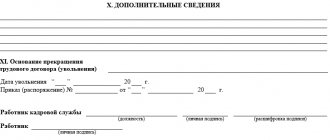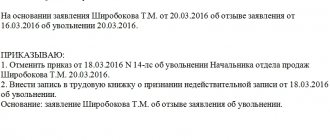Employees performing work functions may deliberately make mistakes and violations, which can cause harm to the company and its reputation. To avoid such violations, the legislator has provided for the possibility of punishing employees.
This procedure is regulated by labor legislation and has a clear sequence of actions that are the basis for imposing a penalty. Violation of this procedure may be grounds for appealing an order to impose disciplinary sanctions.
About current disciplinary measures
types of disciplinary sanctions against its subordinates :
| View | Description |
| Comment | The easiest form of labor responsibility. Must be in writing. The employee is also made aware of such punishment in writing. Usually does not affect the level of material incentives for the employee in the future. |
| Rebuke | The most common type of disciplinary liability. An employee who has received a reprimand does not have the right to be rewarded by the employer for the entire period of this reprimand. All premiums, bonuses, certain types of additional payments and allowances are removed from him. |
| Dismissal | It is considered the most severe type of punishment for disciplinary violations. Typically applied to employees. Who have previously been brought to justice and received penalties such as reprimands. Can be applied to citizens who have committed a serious violation (theft of property, showing up at work drunk, absenteeism without any good reason). |
Special legislation may provide for other types of punishment applied to negligent employees. The procedure for bringing a person to disciplinary liability involves a comprehensive study of the circumstances of the case, the severity and consistency of the offense.
In some cases, consideration of such offenses is carried out with the participation of representatives of the trade union of which the employee is a member. For the order to be legitimate, the trade union must agree with the employer’s arguments and give its approval to bring the employee to justice.
Remember, a penalty announced to an employee must be formalized by order of the employer, have clear wording, a link to the document (instruction) that was previously violated, as well as the type of penalty applied.
Disciplinary action. For information on changes from August 14, 2018, watch this video:
How to apply for early removal of a sentence
To correct a reprimand or reprimand, the employee, trade union (other representative body) or the immediate superior of the offending person must contact the manager. The employee can submit his request in the form of a free-form application. The document must contain the request itself, as well as the grounds on which the offender’s punishment can be lifted early. The statement might look something like this:
The trade union or the head of the department where the offender works can contact the head of the organization by sending him a memo or petition. As in the case of an application from an employee, such a document does not have a set form and is drawn up taking into account the most important details (full name of the manager and applicant, reason for the application and specific proposal, date, signature). It should also include the reason for punishing the subordinate and the reasons why he should be forgiven. A sample of such a petition is presented below.
The application or petition must be taken to the personnel department or the secretariat, where the document will be registered and assigned a number. Such initial data will later be used in the order.
If the head of the company agrees to forgive the offender ahead of schedule, the enterprise issues a special order. Since officials have not approved a sample order for the early removal of a disciplinary sanction, the personnel officer or the person responsible for maintaining personnel documentation can draw it up in any form, not forgetting to indicate the data by which it will be possible to “identify” and legalize the document. Such details include:
- Full name and position of the employee;
- grounds for canceling a reprimand;
- date of its removal;
- all information about the manager (his signature is required) and the document itself (number, date of preparation).
This is important to know: Disciplinary sanctions in the state civil service
We suggest that you familiarize yourself with an example of such an order, based on a petition from the head of the department where the previously punished employee works.
Like any other order from management, the contents of the order must be brought to the attention of the employee against signature.
Deadlines for imposing a penalty and familiarizing the employee with the order
Once a violation has been identified, the employer has a certain period to sort everything out and make a decision to bring the perpetrators to disciplinary action. Depending on the circumstances, the period for imposing a penalty should not exceed:
| Term | In which case |
| One month | In all cases where the culprits are at work. It is possible to perform a full internal investigation or audit. |
| Six months | If the worker who committed the violation is not at work (illness, long business trip, vacation). |
| Two years | If the fact of violation was discovered by an audit of economic activities. It is counted from the day the offense was committed, not its discovery. |
It should be taken into account that if, for reasons beyond the control of the employer (for example, the union deliberately delays the consideration of the administration’s appeal), the deadline for making a decision is postponed, this is not a gross violation.
https://youtu.be/eUNZwG4PnjE
Removal of foreclosure automatically
Removal of a disciplinary sanction in an automatic format does not imply any additional actions on the part of the employer in the form of issuing an order or making a note in a personal file.
The Labor Code takes precedence over other special laws and local regulatory legal acts.
For example, for employees of the Ministry of Internal Affairs, a reprimand is valid for a month, a severe reprimand is valid for a year. For military personnel, such a form of punishment as a severe reprimand entered into a personal file has also been established, and it is valid for a year.
Disagreement with a disciplinary order
If, after the announcement of the penalty, the employee does not agree with the decision made by the employer, he must indicate this at the time of familiarization with the order on the penalty. This is done by making an appropriate entry on the employer’s order itself. This can be a short statement “I do not agree with the collection” or a description of the detailed text why the collection is unlawful.
The consequence of disagreement with the order is usually the preparation of an appeal with a request to cancel this decision to one of the following authorities:
- the company's labor dispute commission;
- to the trade union, and through it to the employer;
- labor inspection;
- the prosecutor's office;
- directly to the court.
To appeal a penalty, you will need to obtain from the employer a copy of the order by which it was announced, and support it with copies of documents confirming the innocence of the person held accountable. It can be:
- A copy of the employment contract and job description.
- Copies of regulations, instructions, rules.
- Official, reports, explanatory notes from the materials of the disciplinary case.
- Eyewitness accounts.
It is advisable to attach to the application the maximum possible number of documents, on the basis of which a decision will be made on the legality of bringing the employee to disciplinary liability.
Considering that certain documents may not be provided by the employer, it is advisable to immediately indicate this in the application. In the future, this document will be requested by the body authorized to consider the citizen’s complaint.
An appeal against a disciplinary sanction can be made in person or through a trade union. At the same time, the trade union has the right to take the initiative and file protests or complaints against the employer’s actions in the following cases:
- at the request of one of its members, to whom a penalty was applied;
- on one’s own initiative, if consent to hold the worker accountable was not provided;
- at the request of a citizen who is an employee of the company, but is not a member of the trade union.
Remember, if you were illegally or groundlessly held accountable and you do not agree with this, you should express your disagreement on the order. Otherwise, such a decision may be considered correct, and the employee’s complaint may be left without consideration.
For information on imposing a disciplinary sanction and appealing it, see this story:
How to place an order
The order can be written on a clean, empty A4 sheet or company letterhead, either by hand or in printed form (this does not matter, but the computer significantly speeds things up). In any case, the document must contain the original signature of the head of the company, as well as the autograph of the employee for whom the order was drawn up (thus the employee certifies that he has read the document). The order can be certified by a seal, but since 2016, the presence of a stamp or seal for legal entities is not a legal requirement.
Once the order is issued, the employee is deemed not to have been subject to discipline. All previously taken measures and restrictions in force in relation to it are cancelled.
The order is drawn up in a single copy and, after its acceptance, as a guide to action, it is sent for storage to the company’s archive, which contains the time established for such documents.
Time limit for appealing an order to impose a disciplinary sanction
The legislator has clearly defined the time frame within which an employee brought to justice has the opportunity to seek protection of his rights. It all depends on the specific situation, so the deadlines for appealing will vary:
- Month . For cases where a citizen was illegally fired from work. Calculated from the date of signing (reading the signed) order and issuing the work book.
- Three months . Determined to appeal against comments and reprimands. This period is considered from the moment the decision is made and the employee becomes familiar with it.
- One year . Regarding violations related to late or incomplete payment of wages.
It is important to indicate that if the deadline established by law was not met for valid reasons, it can be restored. But this will need to be written about in a complaint or lawsuit. Typically, if the missed deadlines were due to the fault of the administration, the beginning of the calculation of the appeal period will be considered the date when the employee became aware of the violation of his rights.
Typically, complaints are reviewed by authorized authorities no later than a month from the date of registration of the complaint. The complaint must be made in writing and officially recorded.
If, after contacting the labor inspectorate or the prosecutor's office, the citizen remains dissatisfied with their decision and wants to go to court, the calculation of the deadlines begins from the day he receives a refusal from the organization that considered his complaint.
Remember, missing the deadlines set by the legislator for considering complaints and claims can become a formal reason for refusing to consider the appeal, even if the citizen is actually brought to justice unlawfully.
Legal requirements
According to Art. 194 of the Labor Code of the Russian Federation, the removal of a disciplinary sanction can be automatic or early - at the initiative of the employer.
The punishment is automatically lifted after a year, unless new offenses have been recorded. In this case, you do not need to fill out any additional paperwork. You can ask for its early repayment, that is, before the expiration of one year:
- himself punished;
- representative body of workers;
- the immediate supervisor of the person who received the reprimand or reprimand.
Since the law does not specify after what time you can apply for the cancellation of a reprimand or reprimand, it all depends on the specific case. Theoretically, this can be done every other day, and after three months, and after six months.
Separately, it is necessary to say about this type of disciplinary action, such as dismissal. It is incorrect to talk about its abolition, since this issue is resolved by a labor dispute resolution body, for example, a court. If a person is reinstated at work, this means that the punishment was applied illegally. It is impossible to remove it. In such a situation, the cancellation of the order to apply a disciplinary sanction in the form of dismissal occurs for other reasons, which must be indicated in the order as the basis for its issuance.
Grounds for appeal
Today there is no single approved list of grounds for appealing disciplinary sanctions.
At the same time, the generalized judicial practice of considering such cases has identified the most common reasons for appeal:
- the level of punishment does not correspond to the severity of the offense committed by the employee;
- there was a violation of the procedure for considering an offense in terms of determining a clear relationship between the actual actions of the offender, the requirements of the work technology, as well as the requirements of his job description;
- during the consideration of the violation, it was not determined whether there was intent in the employee’s actions or whether the situation arose accidentally (due to the actions of production factors beyond the control of the subordinate);
- during the internal investigation, the employer’s commission did not fully study the circumstances of the case, did not take into account the behavior of other colleagues of the alleged culprit, as well as the situation that arose at the time of the offense;
- the legal right of a citizen to refuse to perform work not provided for by his official duties was ignored;
- the employee’s past merits, the availability of incentives, the absence of penalties for past periods of work, health status, and other positive factors that make it possible to reduce the penalty are not taken into account.







